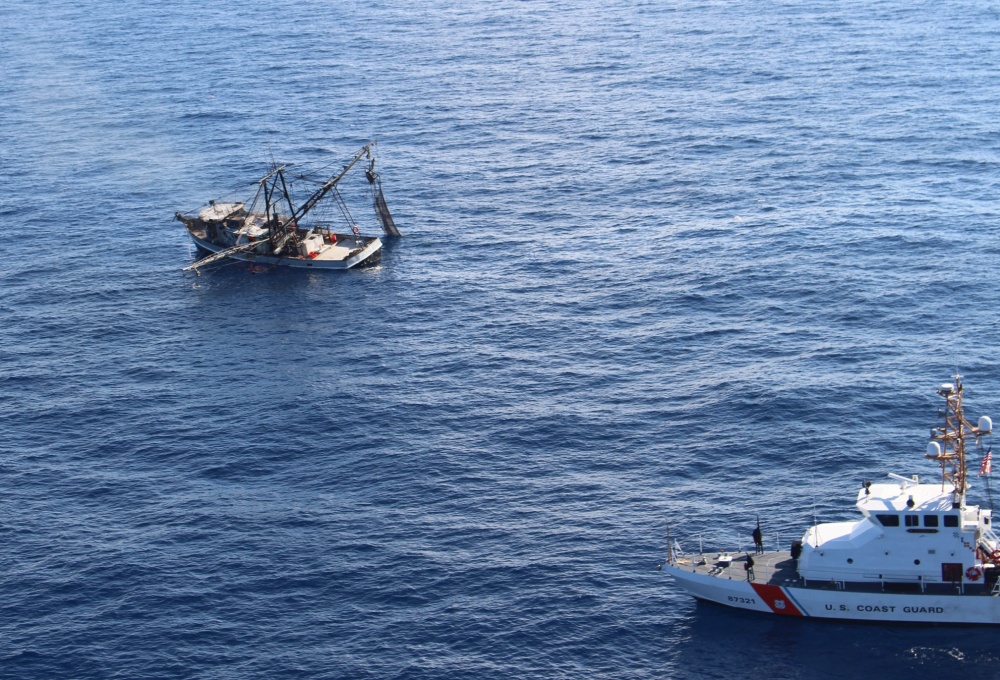Rescue and recovery tales from around the country and beyond. In this edition, fishermen in the Northeast are rescued from freezing waters, a fight to keep up with flooding in the Pacific and multiple medevacs near Cold Bay, Alaska.
Northeast
The crew of the F/V Alex Shea rescued two fishermen after the F/V Born Again began sinking on Cobscook Bay near Pembroke, Maine, on Tuesday, Jan. 23.
At around 11:54 a.m. the captain of Alex Shea issued a distress call after witnessing the Born Again sinking.
A Coast Guard 45-foot rescue boat crew launched from Station Eastport to assist.
The crew of the Alex Shea pulled the two scallop fishermen from the water and transferred them to the Station Eastport rescue boat.
The Coast Guard crew brought the two fishermen to Eastport at around 12:33 p.m. where EMS was waiting.
The fishermen were reported to be hypothermic but responsive.
The water temperature was 39 degrees at the time.
---
On Tuesday, Jan. 30, the Coast Guard rescued four people after a 14-foot skiff capsized in Deep Cove near Eastport, Maine, sending five people into 39-degree water.
A bystander called 911 at 2 p.m. to report the capsizing. One person had managed to swim to shore by that point.

A Coast Guard 45-foot rescue boat crew from Station Eastport transfers four survivors to emergency medical services personnel. Coast Guard photo.
The Coast Guard launched a 29-foot response boat crew to help and diverted a 45-foot boat that was already working nearby to assist.
The 45-footer arrived to find one man on top of the overturned skiff, and two men and a woman holding onto it in the water.
All four people were pulled aboard the boat and taken ashore, where they were cared for by Downeast Emergency Medical Services personnel.
“The people we rescued today are fortunate that a person observed them capsizing and called for help,” said Petty Officer 1st Class Nathan Holt, of Station Eastport. “Because we already had a boat crew training nearby, our response time was significantly decreased. None of the people in the cold water were wearing life jackets or dry suits, so getting them out of the water quickly was critical. We very strongly recommend mariners wear weather-appropriate protective gear when boating in cold weather, as hypothermia can occur in minutes."
Pacific
The Coast Guard rescued five fishermen who had to abandon their flooding boat while working west of Cape Alava, Wash., on Jan. 31.

The crew aboard the Coast Guard Cutter Cuttyhunk is on scene with the crew of the fishing vessel Sunnfjord as their vessel took on water.
Watchstanders at Coast Guard Sector Puget Sound received a report at 1:14 p.m. the 87-foot F/V Sunnfjord was flooding, and with all their dewatering pumps running, the crew was unable to keep up with the rising water.
The Coast Guard launched a rescue crew consisting of the crews aboard Coast Guard cutters Cuttyhunk and Swordfish, an MH-65 dolphin helicopter from Port Angeles and two motor lifeboats from Quillayute River and Neah Bay stations. Good Samaritans aboard the vessels Island Voyager and Equinox, and the crew of the F/V Eclipse also assisted.
While responders were in route, the fishermen aboard the sinking vessel told officials they had put on survival suits and life jackets as the water had risen above the floorboards in the engine room.
When the crew of the Cuttyhunk arrived, the captain of the Sunnfjord insisted that they attempt to dewater the vessel and not abandon ship. But the Sunnfjord soon lost main engine power, and the crew was unable to start either of the pumps given to them by responders. The fishermen made the decision to abandon ship and were picked up by one of the motor lifeboats.
The crew of the Cuttyhunk remained on scene to observe the condition of the Sunnfjord, which sank approximately six miles offshore in an estimated 300-foot water with a about 800 gallons of diesel reported aboard.
Alaska
A Coast Guard Air Station Kodiak MH-60 Jayhawk helicopter medevaced two men on Monday, Jan. 22, from F/V Ocean Peace and F/V Northern Patriot about 135 miles north of Cold Bay.
At about 5 p.m., a helicopter crew hoisted a 21-year-old man aboard the Ocean Peace who was suffering from seasickness and loss of consciousness. At 6:30 p.m., the crew also hoisted a 37-year-old man from the Northern Patriot who had suffered a hip injury. Both men were safely transported and transferred to medical services.
Weather at the scene of the medevac consisted of 30- to 40-mph winds, 14- to 18-foot seas and 10 miles visibility.
---
A Coast Guard Air Station Kodiak helicopter crew medevaced a 59-year-old man from the 210-foot F/V Ocean Rover about 70 miles west of Cold Bay, Alaska, on Jan. 28.
The 17th Coast Guard District command center received a medevac request from Health Force Partners for a man suffering abdominal pain at approximately 6:26 a.m.
The helicopter crew hoisted the man and safely transported him to emergency medical personnel, which then transferred him to Anchorage.
"This is exactly why we have our assets forward deployed to Cold Bay during the winter fishing season,” said Lt. Danny Piazza, 17th district command center command duty officer. “Our crews can eliminate hours of flight time in the Bering Sea and Aleutian Islands, ensuring the safety of mariners.”







